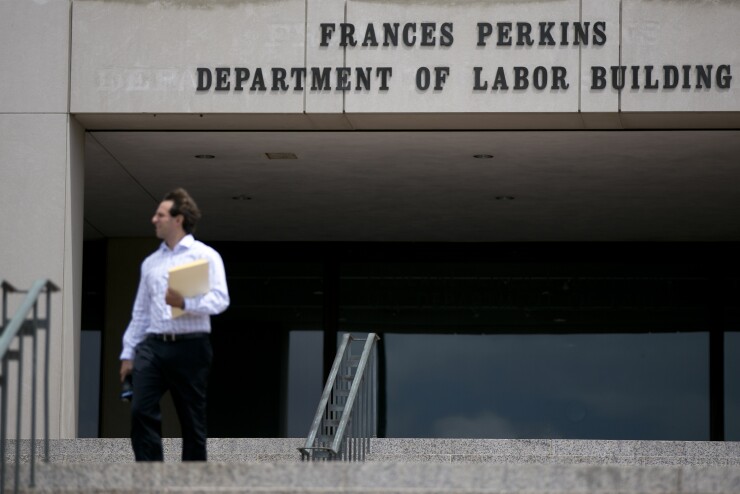In response to the Fifth Circuit Court of Appeals’ decision to vacate the U.S. Department of Labor’s fiduciary rule, the DOL this week issued a temporary ban on enforcement of prohibited transaction claims against advice fiduciaries who appear to be acting in good faith. The DOL’s action attempts to comply with the impartial conduct standards for transactions that would have been exempted under the rule’s best interest contract and principal transactions exemptions.
For financial advisers, that means that if they inadvertently take part in a prohibited transaction, they don’t have to worry about an investigation or punitive actions from the DOL or the IRS.
On the other hand, for plan sponsors, it’s important for them to understand that the relationship they have with their plan adviser has changed. Their adviser is still expected to be a fiduciary to the plan if they have said they are a fiduciary. They must comply with the DOL’s impartial conduct standard and the five-part test that existed before the fiduciary rule went into effect.

The five-part rule determines who is a fiduciary when it comes to investment advice. To be considered a fiduciary, the person giving advice would have (1) made recommendations on investing in, purchasing or selling securities or other property or give advice as to the value, (2) give that advice on a regular basis, (3) pursuant to a mutual understanding that the advice (4) would serve as a primary basis for investment decisions, and (5) would be individualized to the particular needs of the plan regarding such things as investment policies or strategy, overall portfolio composition or diversification of plan investments.
The fiduciary rule’s prohibited transactions won’t be enforced by the DOL or the IRS, but that doesn’t mean a plan or plan participant couldn’t bring charges against their adviser if they suspect they aren’t acting as a fiduciary.
“I believe the DOL did the right thing for plans as well as for advisers in issuing the bulletin,” says John Ryan, a partner in Seward & Kissel’s employee benefits group. “What some people seem to be missing is that advisers who elected to rely on the BIC exemption acknowledged their fiduciary status. Under the reinstated five-part test, the element that was principally relied upon to avoid fiduciary status was the ‘mutual understanding’ prong of the test.”
He adds, Therefore, it is likely that under the reinstated five-part test, these advisers will still be fiduciaries to plans and IRAs but will not be able to rely on the vacated BIC exemption should they engage in a prohibited transaction.”
Ryan notes that the non-enforcement policy set out by the DOL allows these advisers, who have said they are fiduciaries, to engage in transactions that likely are prohibited transactions without worrying that the DOL or the IRS will enforce those rules, provided they act in accordance with the impartial conduct standards.
“To me that’s what the purpose of the non-enforcement action was, not to put people in the untenable situation of being fiduciaries under the five-part test but not having exemptive relief because the BIC or principal transaction is gone,” Ryan says.
Ryan says that his hedge fund clients reacted to the fiduciary rule by not accepting investments from IRAs unless the investor could represent that they had a professional adviser telling them to invest in the fund, for example.
“That was true even if the investor owner was George Soros,” Ryan says. “Unless he would go pay an additional investment manager to advise him about investing in the fund, the funds wouldn’t accept new or additional investments from an IRA,” he says. “I don’t think anyone feels that anything the SEC might put out is going to affect the ability of qualified purchasers to invest in hedge funds.”
Many companies and industry groups thought the DOL overstepped its authority when it issued the fiduciary rule on April 8, 2016. They felt that that rulemaking should, instead, have come from the Securities and Exchange Commission.
The SEC weighed in on the question of who is and isn’t a fiduciary after the Fifth Circuit decision was handed down. In April, the SEC released its own set of proposals about how broker-dealers and registered investment advisers should behave toward their retail clients.
The DOL’s non-enforcement policy will continue until the SEC releases its final rules or the Department of Labor releases its own. In the meantime, fiduciary advisers must comply with the Impartial Conduct Standards that were put into place while the DOL took a closer look at the best interest contract and other exemptions that were included in the final fiduciary rule.
“The DOL also suggested that it is working on a proposed and temporary exemption that will be retroactive to June 9 of last year and that will be prospective — until there is a final exemption,” says Fred Reish, partner at Drinker Biddle & Reath, LLP, in a blog post.
“The delay in the final exemption is because, in all likelihood, the DOL will want to incorporate the provisions of the SEC’s proposed Regulation Best Interest,” he says. “However, it is unlikely that the DOL would incorporate those conditions without seeing the final SEC regulation.”





